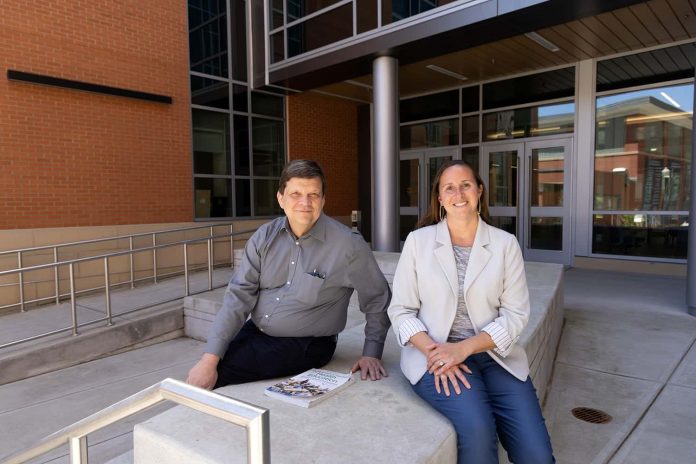Sarah Benes, assistant professor and coordinator of the School Health Education program, is determined to make Southern a leader in the health and physical education field. The field has changed greatly in recent years, notes Benes, a past president of SHAPE (Society of Physical and Health Educators) America in 2023-24, the largest national organization for health and physical education teachers. And, recognizing those changes, she’s doing all she can to help bring Southern’s program into the forefront of the field.
“It’s very different today,” she says of the discipline. “It was very much focused on content before. Now, it’s more focused on building skills and supporting the whole child to maintain or enhance health and well-being of self and community. We’ve come a long way from what most people remember from their health ed classes,” says Benes, co-author of The Essentials of Teaching Health Education (Human Kinetics).
“I think the most impressive thing…is her energy level,” says Gary Morin, chair of the Department of Health and Movement Sciences. “Sarah has established herself as one of the national leaders in School Health Education and as such makes Southern’s program one of the premier in the country.”
Morin adds that in her short time here, Benes has expanded on the foundation created by Bonnie Edmondson, associate professor emeritus of school health education, who retired in 2022, to build a strong, high-quality graduate program that’s current in its field, while serving as president of SHAPE, publishing texts and in journals, and presenting at conferences nationwide. Benes also recently shared her work in health equity at a conference in Finland for the International Association for Physical Education in Higher Education (AIESEP).
While her primary role is running the master’s program, she teaches three courses each semester, both undergraduate and graduate. In fall 2024, she’ll teach a new course in racial health disparities and social justice. One of her goals is for the graduate School Health Education program to be one of the top fully-online master’s programs in the U.S., or at least the Northeast. “I’d love to bring in more people from around the country for these night online classes,” she says.
In 2023, Southern introduced a bachelor’s degree program in health and wellness coaching that’s the first of its kind in the Northeast. Benes helped create courses for the program, such as a foundations course on the principles behind health coaching, applied skill development (where students learn skills like active listening, motivational interviewing, how to interact with other people, how to create goals, and looking at what’s positive), and practicing being a coach with clients, being observed, and getting feedback. Graduates are prepared to take the exam from the National Board of Health and Wellness Coaching, and jobs range from placements in schools, community health centers, and medical offices to owning a business as a health and wellness coach.
Coaching isn’t about having a narrow focus on diet and exercise, as one might expect, Benes explains. Rather, it is “much less about giving information — you help clients create a health and wellness vision to see where they want to be, help them tap into their existing strengths, assets, and resources, figure out what to focus on and set three-month goals. This can range from wanting to drink at least three glasses of water a day, reaching out to a friend to take a walk to wanting to journal each night. Everyone has different goals.” She describes a coach’s process as possibly including weekly check-ins with a client to see if they’re achieving their goals and connecting to their vision, and setting specific goals for the following week, starting with what went well. “My job is to listen, and use what they’re sharing to help guide them,” she says.
While Benes majored in athletic training at the University of Connecticut, providing rehabilitation for athletes or responding to injuries on the field, she acquired graduate degrees in health education and public health at Boston University and the University of Massachusetts at Amherst because “I fell in love with health and physical education. I’ve always had the orientation to service.” She enjoys being an advocate for a field she feels strongly about, so at SHAPE America she started out on its health education council, which inspired her to run for its board, serving on the board for three years before she ran for president. During her presidency, SHAPE released a new set of health education standards for the first time, helping to advance the fields of health and physical education.


